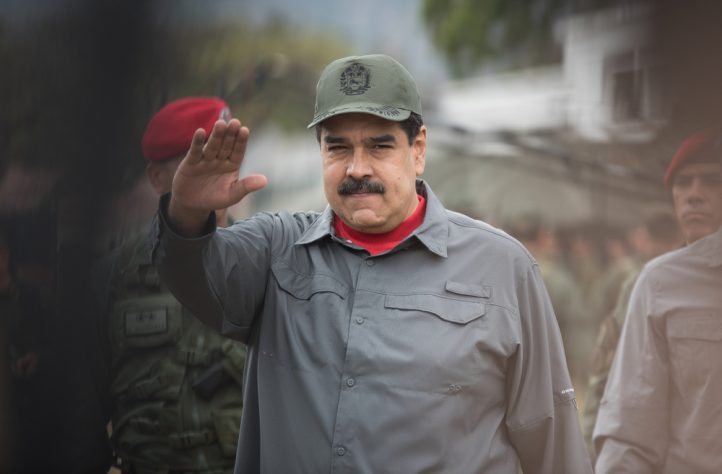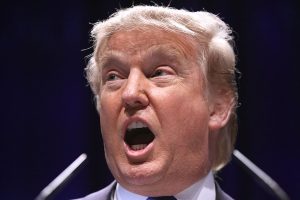by John Feffer
Thousands of people, mostly women, protested the food shortages in their country by banging on pots and pans as they marched in the streets. They loudly opposed the socialist policies of the government. The police eventually dispersed the protestors, but pressures on the government were mounting. In response, the government complained loudly about a U.S.-led policy of economic strangulation and isolation. At the United Nations, the president of the country worried that the United States would support a military coup to oust him.
This was Chile in 1971. And the president of the country, Salvador Allende, was right to worry about U.S. intervention: he would be overthrown and killed in a coup in 1973.
But this is also Venezuela in 2019. Anti-government protesters face even worse food shortages that have brought thousands onto the streets to bang on pots and pans. This is no manufactured crisis. In 2017, according to Reuters, Venezuelans lost an average of 24 pounds, and nearly 90 percent now live in poverty. The Venezuelan government has responded to the protests not only by dispersing them but, after the most recent demonstrations, killing 40 people and detaining 850. This is on top of the government killing dozens of people as a result of protests in 2017 and throwing hundreds of political opponents in jail.
The president, Nicolas Maduro, blames the United States for the country’s economic woes. But prior to the Trump administration’s move in August 2017 to restrict Venezuela’s access of international financial markets, U.S. sanctions were focused on specific individuals and didn’t affect the overall economy. The country’s economy was in free fall well before the Trump administration took office. And the United States has continued to import oil from Venezuela: in 2017, it was the fourth largest supplier to the United States.
Venezuela’s economic miseries are largely homegrown, and they are particularly painful given the huge oil resources at the country’s command. But Maduro, and Hugo Chavez before him, failed to diversify Venezuela’s economy away from petroleum, which made Venezuela vulnerable when oil prices fell (and a drought paralyzed the country’s hydroelectric sector). Add corruption and gross mismanagement to the mix and the country’s economy shrank by half between 2013 and 2018.
The world is divided, by country and by ideology, about whom to support in Venezuela: the embattled president or the opposition.
Nearly half a century ago, the international left rallied around Salvador Allende, a Marxist who came to power through free elections, and roundly condemned U.S. interventions. Today, the left — and many others — are also vigorously protesting against U.S. efforts to intervene in Venezuela. And that’s absolutely the right thing to do. Although Maduro is wrong about the cause of his country’s economic problems, he is right to condemn Washington for its regime-change policies.
Still, no one should rally around Nicolas Maduro. He is no Salvador Allende. Maduro is corrupt and undemocratic. He outlawed the National Assembly because it opposed his policies and created a rubber-stamp parliament to take its place. Like Nicolae Ceausescu in Romania or Bashar al-Assad in Syria, Maduro is a “socialist” in name alone. True, he supports the redistribution of the wealth — but into the pockets of himself and his cronies. He is cut from the same political cloth as Russia’s Vladimir Putin and Turkey’s Recep Tayyip Erdogan. He presides over the closest thing to a failed state in Latin America, as I pointed out more than two years ago.
The protests that have broken out in Venezuela are like the ones that targeted Hosni Mubarak in Egypt in 2011, that filled the streets in Hungary against Viktor Orban earlier this month, that are still going on today against Omar al-Bashir in Sudan. They all target autocrats. Salvador Allende was elected democratically and governed democratically. Maduro is part of an altogether different authoritarian tradition.
Opposing military intervention by the United States is necessary, but not sufficient. As an international declaration spearheaded by Venezuelan leftist intellectual Edgardo Lander puts it, it’s essential as well to:
Reject the authoritarianism of the Maduro Government, as well as the government’s repression in the face of growing protests throughout the country, for food, transportation, health, political participation, public services, living wages, among others. The Venezuelan people, who suffer the enormous precariousness and the current repression, have the right to protest without being criminalized for it.
Venezuelans not only have the right to protest. They have the right to choose the government they want.
What’s Next for Venezuela?
The Trump administration always thinks in zero-sum terms. It is insisting that the world choose between Maduro and Juan Guaido, the head of the outlawed National Assembly who declared himself interim president on January 23. A number of countries have joined the United States to line up behind Guaido: Canada, Australia, Taiwan, Brazil, Colombia. Maduro, meanwhile, can count on the support of Russia, China, Turkey, Bolivia, Syria, and South Africa.
Europe is on the fence. It has issued an ultimatum to Maduro: announce new elections by next week or the EU may well recognize Guaido. Maduro has rejected the ultimatum.
Venezuelans are not enthusiastic about Maduro. At the time of the May 2018 presidential elections, his approval rating was down around 20 percent and yet he won 68 percent of the vote (the opposition largely boycotted the vote). Public disapproval has been low for some time: in March 2016, around 63 percent of Venezuelans wanted Maduro to step down. Even the working-class base of his predecessor, Hugo Chavez, has shifted against the current president.
In Chile, Allende’s opposition came from the wealthy and the middle class. In Venezuela, food shortages, hyperinflation, high unemployment, and rampant corruption have alienated virtually all sectors of society from the ruling party. A couple million Venezuelans have voted with their feet and now await the day when they can return to a well-functioning country.
A few prominent Venezuelans have called for outside intervention. But despite the hardships they face and the tenacity of their autocratic ruler, a majority of Venezuelans opposes foreign intervention. And indeed, U.S. moves so far — the threats, the sanctioning of Venezuela’s state-owned oil company — have given Maduro a way to deflect responsibility for the country’s problems away from himself. The United States, given its abhorrent record in Latin America and the insanity of the current administration, should just stay out of it.
The way forward is clear: Maduro should step down and accept an amnesty, and then Venezuelans can vote for a new government in free and fair elections. The longer Maduro hangs on, the more divided the country will become and the greater the likelihood of outside intervention. Most recently, the Venezuelan president has shown some willingness to submit to an international mediation effort. But so far he is refusing to consider relinquishing power or even calling for new presidential elections.
The Left and Democracy
The political left has been, from its beginnings in the French Revolution, against monarchs and in favor of popular sovereignty. During the nineteenth century, one segment of the left drifted away from democracy to support dictatorship, in this case of the proletariat. This illiberal model has either collapsed (the Soviet Union) or morphed into something that no longer represents the interests of workers (China).
It’s distressing to see the left rally around illiberal leaders either because of their professed “socialist” beliefs or because they present themselves as a counterforce to U.S. power in the world. It was embarrassing to see the left make excuses for China or the Soviet Union during the Cold War. And it’s mortifying to see the left makes excuses for Vladimir Putin or Xi Jinping or Nicolas Maduro today.
The left has a proud tradition of both democracy and anti-imperialism. It’s critical to keep both traditions in mind when addressing the current crisis in Venezuela.






Venezuelan crisis has eclipsed Syrian civil war. The U.S. withdrawal from embattled Middle East has shifted focus on Latin American country, Venezuela known for anti – U.S. stance.
The economic crisis ia a self– made due to Kleptocracy, and embezzlement of revenues generated from oil.
Further, Caracas economy is dependent only on oil. It did not diversify. When the oil prices touched base, the growth began to crumble leading to mass protests amidst recent electoral fraud in presidential election. Maduro won against peoples will.
It is natural for any poltical fabric, people expect minimum services from government. The inefficient rulers always blame foreign hands to cover for lapses. At present U.S. is accused no.1. But in reality, Washington is fourth largest importer of oil from Caracas.
The remaining Latin American countries opposing the continuation of Maduro demanding resignation. Even EU also pressing for fresh elections but Maduro brushed aside.
In these fluid political situation, Trump and his team contemplating for military intervention — covert/ overt with the aid/ help of Lima group of countries.
The analysts opine that neither intervention is necessary nor warranted nor demanded by Venezuelans.The U.S. has earned the nickname ” country of intervention, retreat, without tangible result except chaos” as is evident in Syria, Afghanistan.
John,
Your arguments regarding Venezuela’s sorry economic state are compelling. However, not being able to market it by deliberate US financial pressure certainly contributes to the sorry Venezuelan economic condition. It is clear, the US has had a historic fear of socialism, particularly if that socialism is tied to oil. In this case not only linked to oil, but to the nation with the world’s largest proven reserves of the stuff.
I believe in your observations you sense that bullying, intimidation and out and out threats of force by the US are somehow not reprehensible in this case. I am sorry, national sovereignty the fundamental bulwark of international law is at stake here. For a country that is obsessed with alleged Russian interference in its 2016 presidential election (Google quantifies the amount spent by Russian accounts as $47,000.00 and Facebook says that similar accounts spent $105.000.00, 55% of which was spent after the election all in an election where over 2 billion was spent on influencing voters) I think that reasonable people should see this US hypocrisy, particularly when its senior bully, Secretary Pompeo, expresses his concern for the “rule of law.”
Further, Pompeo has the temerity to publicly play the fear card which is invariably effective with our over propagandized, dulled masses by declaring that our national security is at risk for Cuban and Russians right now are in Venezuela busily up to no good.
Venezuela today, the Ukraine yesterday, Chile, Syria, Guatemala, et al have seen the same tried and proven play book. This is not normal human behavior. It can not be allowed. It indicates a country out of control. Those in control are grabbing at anything of worth while they have the control of unchallenged military might to do so. This is opportunistic, selfish and evil behavior. Pompeo’s behavior is best compared to Von Ribbentrop’s threats to neighboring small states in the 30’s. I guess I am a bit worked up. We should all be.
I don’t much like this analysis. I don’t like the reference to Syria and its President Al-Assad; I’ve opined for years that, if the bully US would require the greater bully Zioentity so-called Israel to get out of Syria (Golan), stop invading Syria’s airspace and bombing it daily et al, President Al-Assad would be freed to address his country’s problems unfettered (unfeffered?).
I saw a blog w/photo the other day by British diplomat/ambassador Craig Murray, whom I admire unreservedly. The photo showed protesting Venezuelans…Amb. Murray pointed out that a close look at their faces showed their well-fed, rich personas intent on returning the country to upper-class/oligarchy rule. The US needs to get the hell out of Venezuelans’ internal affairs and HELP Venezuela rather than impede the people’s march toward economic, educational, health, social, political participation in the country. Viva Venezuela in the image and style of hero Hugo Chavez!
Mr. Feffer, I think you paint far too rosy a picture of the Venezuelan opposition. Example, its primary platform plank is privatization of the Venezuelan oil industry. That is one of the many reasons that the opposition has never been able to win an election; it is a party of oligarchs. And their ascension to power would make things even worse for the public; it is, after all, the government’s oil revenue that pays for what help the people do get from their government.
You err in stating that Maduro “outlawed the National Assembly.” The National Assembly was dissolved by the country’s Supreme Court, not Maduro, because it refused to comply with court orders that because certain representatives took office illegally they must be ejected from the Assembly.
You also largely whitewash U.S. responsibility for the extreme poverty (and runaway inflation) the citizenry is experiencing. This U.S. coup attempt is the third since 2000, with the previous two attempts failing. The U.S. and its Venezuelan client oligarchs are largely responsible for the shortages of consumer goods that set off one of the worst inflationary spirals in modern history.
The crisis was further worsened when the U.S. persuaded the Saudis to drive up the world supply of oil and crash oil prices in order to put further pressure on Venezuela.
Juan Guaido’s claim to the Presidency is absurd. He relies on a section of the Venezuelan Constitution that governs when the Presidency is vacant, i.e., by death or disability. And even in that circumstance, the elected Vice President is to assume the office of President, not Mr. Guaido. For the U.S. to back such an absurd claim is to dishonor the concept of the Rule of Law.
I agree that the U.S. should butt out but disagree with your position that Maduro should resign. He was elected in a free and fair election, even certified as such by Jimmy Carter and his election monitoring It is for the Venezuelan people, not an American pundit, to decide whether he remains in office, either through recall vote or at the next election.
Just ingenious! Since we couldn’t achieve exporting democracy to the other places like Afghanistan or Iraq by invading them, now we are trying to export democracy by using coup and chaos as a carriers. What’s wrong with this picture since internally we have been, and still are, investigating the meddling of Russia in our own 2016 election for the past 2 years?
Question: What is wrong with the foreign policy planners in this country?
Just curious when are we going arrest and prosecute a few of the foreign policy planners since the planners have truly and miserably failed this country for the past 2 decades?